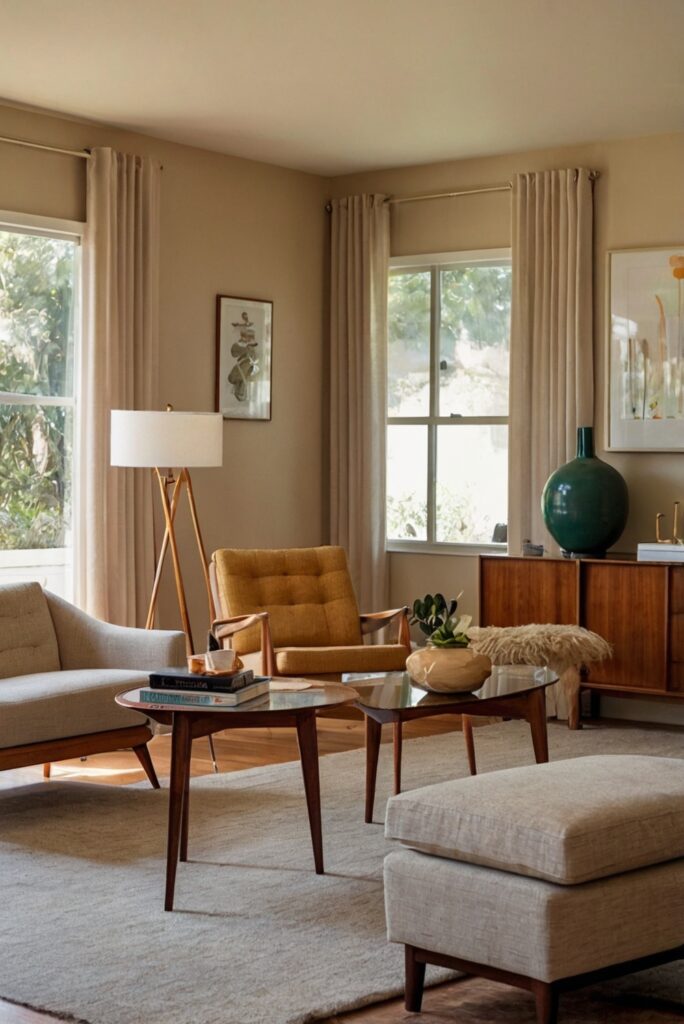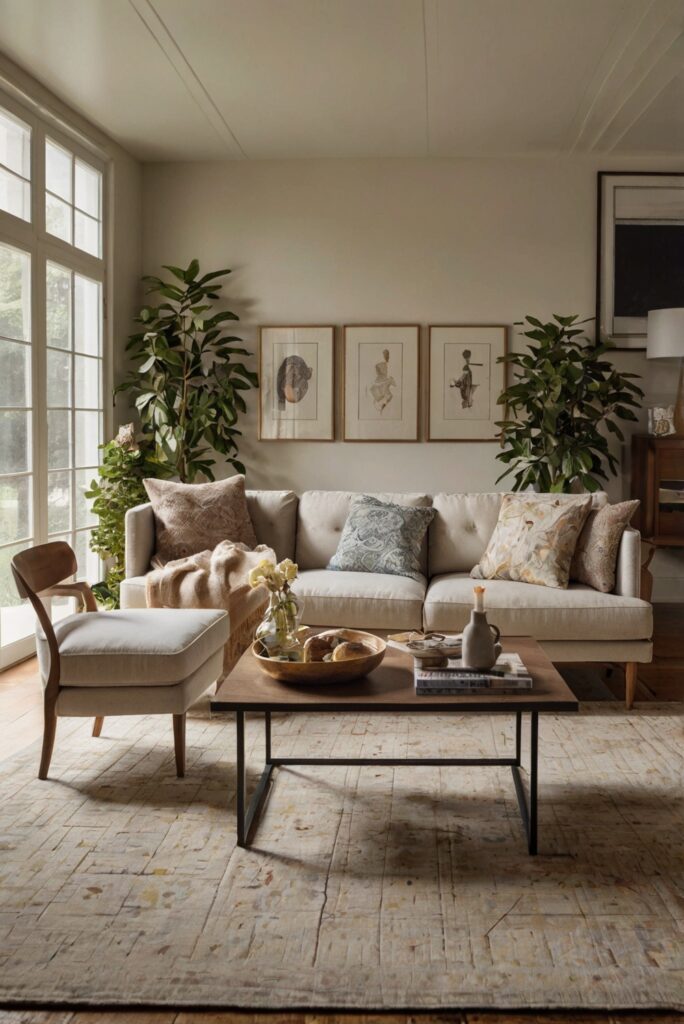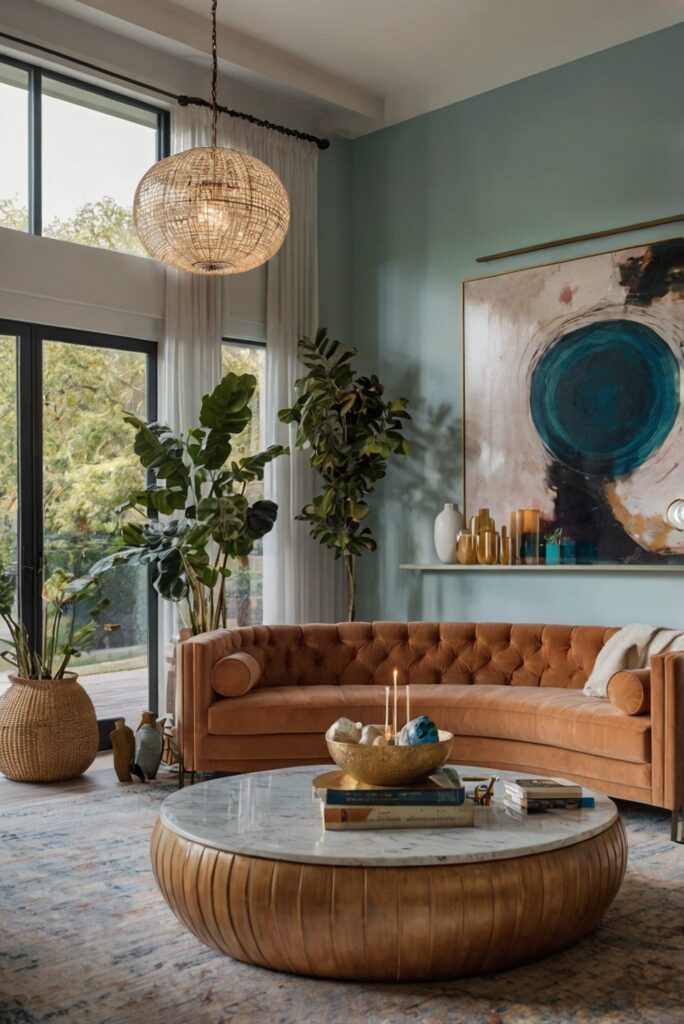Learn how to style a Mid-Century Modern living room with expert interior designer tips. Discover decor ideas and create a stylish and timeless space.
To style a mid-century modern living room, start by choosing a color palette that includes earthy tones and bold pops of color. Incorporate iconic mid-century furniture pieces such as a clean-lined sofa, a sleek coffee table, and a statement lighting fixture. Accessorize with geometric patterns, abstract art, and vintage accents to add personality to the space. Ensure proper space planning by keeping the layout open and clutter-free. Use primer paint for the walls before applying colors and opt for a color matching paint for a cohesive look. Incorporate plants for a touch of greenery and warmth. Stay true to the mid-century modern aesthetic by keeping the design clean, functional, and timeless.
Key Elements of Mid-Century Modern Style
When styling a mid-century modern living room, it is crucial to understand the key elements that define this style. Mid-century modern design emerged in the mid-20th century and is characterized by clean lines, organic shapes, minimal ornamentation, and a focus on functionality. Some key elements to keep in mind include:
- Use of natural materials such as wood, leather, and metal
- Iconic furniture pieces like the Eames Lounge Chair or Noguchi Table
- Bold geometric patterns and colors, especially in textiles
- Integration of indoor and outdoor spaces through large windows and open floor plans
- Emphasis on simplicity and functionality in design
Furniture Selection and Placement
Choosing the right furniture is essential when styling a mid-century modern living room. Opt for pieces with clean lines and organic shapes that reflect the style’s emphasis on simplicity and functionality. Consider iconic mid-century modern furniture designs or look for modern reproductions that capture the essence of the era. When placing furniture, create conversation areas that encourage social interaction and allow for easy traffic flow. Remember to leave space between furniture pieces to maintain a sense of openness and airiness in the room.
Color Palette and Textures
The color palette of a mid-century modern living room typically includes a mix of bold, vibrant hues and neutral tones. Consider using colors like mustard yellow, avocado green, or burnt orange to add a pop of retro flair to the space. Pair these bold colors with neutral shades like white, gray, or beige to create a balanced look. In terms of textures, incorporate natural materials like wood, leather, and wool to add warmth and depth to the room. Mix and match textures to create visual interest and a sense of coziness in the space.
Lighting Design and Fixtures
Lighting plays a crucial role in setting the mood and ambiance of a mid-century modern living room. Opt for sleek and sculptural lighting fixtures that complement the overall design aesthetic. Statement pieces like a Sputnik chandelier or a Nelson Bubble Lamp can add a touch of retro charm to the space. Consider incorporating floor lamps, table lamps, and wall sconces to create layers of light and illuminate different areas of the room. Experiment with different lighting sources to achieve a warm and inviting atmosphere.
Accessories and Decorative Elements
When it comes to accessorizing a mid-century modern living room, less is often more. Choose a few statement pieces that reflect the style’s emphasis on form and function. Consider incorporating vintage items like a retro clock, ceramic vases, or abstract artwork to add character and personality to the space. Use decorative elements sparingly to avoid clutter and maintain the room’s clean and uncluttered look. Remember to incorporate plants and greenery to bring a touch of nature indoors and add a sense of freshness to the room.
In conclusion, styling a mid-century modern living room requires a careful balance of key elements, furniture selection, color palette, lighting design, and accessories. By following these guidelines and incorporating the essential components of mid-century modern design, you can create a stylish and inviting space that pays homage to this iconic design era. Remember to infuse your personal style and preferences into the room to make it truly your own.
1. What are key elements of a mid-century modern living room?
To style a mid-century modern living room, key elements include clean lines, organic shapes, and a mix of materials like wood, metal, and glass. Furniture with tapered legs, bold colors, and geometric patterns are also characteristic of this design style.
2. How can I incorporate retro pieces into a mid-century modern living room?
To incorporate retro pieces, look for vintage furniture from the 1950s and 1960s that have a mid-century modern aesthetic. Mix these pieces with contemporary items to create a curated and eclectic look.
3. What colors work best in a mid-century modern living room?
Colors like mustard yellow, olive green, and burnt orange are popular choices for mid-century modern living rooms. These warm and earthy tones can be complemented with neutrals like white, gray, and black for a cohesive color palette.
4. What lighting fixtures are ideal for a mid-century modern living room?
Sputnik chandeliers, arc floor lamps, and pendant lights with a retro flair are ideal choices for lighting in a mid-century modern living room. These fixtures add a touch of drama and sophistication to the space.
5. How can I add texture to a mid-century modern living room?
To add texture, incorporate elements like shag rugs, velvet upholstery, and textured accent pillows. You can also mix and match different materials like leather, wool, and brass to create a visually interesting and inviting space.



